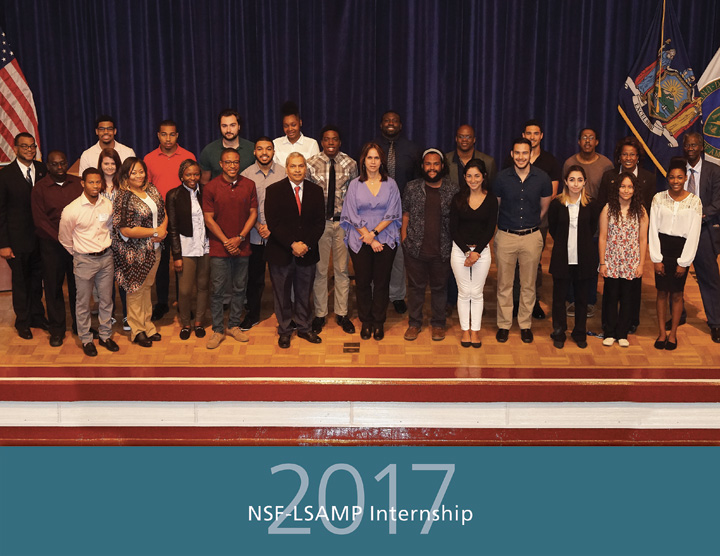Establishing a Diverse Workforce at the National Laboratories
National Science Foundation Louis Stokes Alliance for Minority Participation program funds student and professor research at Brookhaven National Laboratory
July 11, 2017
 enlarge
enlarge
The 2017 visiting students and professors funded through the NSF LSAMP program, with Brookhaven program manager Noel Blackburn pictured on the far left.
In the summer of 2017, the U.S. Department of Energy’s Brookhaven National Laboratory welcomed nineteen undergraduate interns and seven professors through the National Science Foundation’s Louis Stokes Alliance for Minority Participation program (NSF LSAMP). These guest researchers come from all over the nation and have already leapt into research on a wide variety of topics, from gamma ray detection to wildlife conservation.
The LSAMP program works to increase the number of minority students, specifically those from populations underrepresented in science and engineering, earning high quality baccalaureate and advanced degrees in science, technology, engineering, and math (STEM). The program collaborates with universities and institutions to provide opportunities for these students to move forward in STEM, like conducting research at a national lab.
“Undergraduate research is a hallmark piece of our efforts to allow targeted minority groups to be the best that they can be,” says the director of the NSF LSAMP program, Dr. A. James Hicks. By hosting these students, Brookhaven Lab provides them with unparalleled research experience. “Nowhere are the students exposed to scientists like the scientists here, nor the equipment, the facilities, or the experiences. What they get here they won’t get at their home institutions,” says Deidra Hodges, an electrical engineering professor from the University of Texas at El Paso who receives LSAMP funding. She brought four undergraduate students with her to Brookhaven Lab this summer, all of who are formally conducting research for the first time.
They'll come away with publications and with research experience from a national lab, as an undergrad! That's life-changing.
— Deidra Hodges
The visiting students and faculty have travelled here from Alabama A&M, Cheyney University, Howard University, Lincoln University, Southern University at New Orleans, Texas Southern University, University of Texas at El Paso, and University of Puerto Rico Rio Piedras. They are already deep in their summer research, with highly diverse focuses in nuclear physics, scientific computing, climate science, structural biology, mechanical and electrical engineering, and materials chemistry. With Brookhaven Lab’s resources, they have opportunities to make incredible discoveries and leave the summer with plenty to show for it. “They’ll come away with publications and with research experience from a national lab, as an undergrad!” says Hodges, “That’s not the norm. That’s life-changing.” Many are conducting research at facilities like the National Synchrotron Light Source II, the Center for Functional Nanomaterials, and the Relativistic Heavy Ion Collider—all world-class research facilities that host some of the best researchers from around the world.
But the experiences at Brookhaven Lab that LSAMP provides aren’t just about the research outcomes. They’re about educating and inspiring “some of the best and brightest students” to be the next generation of leaders in STEM, says Hicks. If America hopes to maintain its strength and heft in science, it needs a field comprised of diverse minds. “We are making a major contribution to America’s science and engineering enterprise,” says Hicks, “It’s a great opportunity to ensure that America’s talent pool will be ready for all challenges as we move forward.”
The program is doing its job well. A number of interns, including those who hadn’t done research before, are now looking to move deeper into their STEM education. One of Hodges’ electrical engineering students, Jenny Lopez, says, “I didn’t have a goal in mind before coming to Brookhaven Lab, but now I really want go to grad school and do research.” Even those who aren’t sure what career path lies ahead get the chance to explore the enormous spread of cutting-edge research at Brookhaven Lab. “This is a unique experience that the program is giving me as a minority,” says Andrea Ramirez-Puentes, an undergraduate from the University of Puerto Rico, “It is going to help me define my interests and know if I want to pursue a career in science.”
Noel Blackburn, the program’s manager at Brookhaven Lab, insists that the benefits of this program go both ways. “We know the value of this program to the students, but the Brookhaven Lab scientists and engineers enjoy mentoring these talented scholars too, as they bring enthusiasm and a questioning mind. This is vital to good research.” Overall, the NSF LSAMP program sets up these students, the Lab, and our nation for a strong future in science.
The LSAMP-funded professors and undergraduates hosted by BNL in the summer of 2017 are:
Alabama A&M University: Dr. Mebougna Drabo, Myles Moore, Derrius Plair
Cheyney University: Dr. Abdelaziz Bior, Abioye Mohammed, Brendyn Van Demark, Miesha Wilson
Howard University: Dr. Marcus Alfred, Gaylon Robinson, Abigail Paysinger
Lincoln University: Rumeel Jessamy, Ronald Lashley
Southern University at New Orleans: Dr. Murty Kambhampati, Trevor McIntosh, Precious Williams, Tre Wise
Texas Southern University: Dr. Mark Harvey, Kalifa Kelly, Jessie Zapata
University of Puerto Rico, Rio Pierdras Campus: Dr. Olga Mayol-Bracero, Kevin Santana-Rodruiquez, Andrea Ramirez Puentes
University of Texas at El Paso: Dr. Deidra Hodges, Jenny Lopez, Jazmin Munoz, Robert Sifuentes
2017-12336 | INT/EXT | Newsroom









